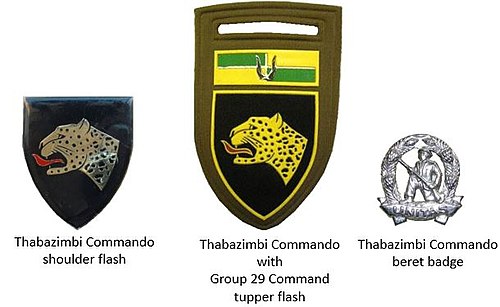Thabazimbi Commando
This is an old revision of this page, as edited by Dl2000 (talk | contribs) at 04:09, 17 October 2019 (→References: reflist auto). The present address (URL) is a permanent link to this revision, which may differ significantly from the current revision.
| Thabazimbi Commando | |
|---|---|
 Thabazimbi Commando emblem | |
| Country | |
| Allegiance | |
| Branch | |
| Type | Infantry |
| Role | Light Infantry |
| Size | One Battalion |
| Part of | South African Infantry Corps Army Territorial Reserve, Group 14 and later Group 29 |
| Garrison/HQ | Thabazimbi |
Thabazimbi Commando was a light infantry regiment of the South African Army. It formed part of the South African Army Infantry Formation as well as the South African Territorial Reserve.
History
Origin
This section is empty. You can help by adding to it. (March 2015) |
Operations
With the SADF
During this area, the unit was mainly engaged in area force protection, search and cordones as well as stock theft control assistance to the rural police.
This unit fell under the command of the SADF's Group 29.
With the SANDF
Disbandment
This unit, along with all other Commando units was disbanded after a decision by South African President Thabo Mbeki to disband all Commando Units.[1][2] The Commando system was phased out between 2003 and 2008 "because of the role it played in the apartheid era", according to the Minister of Safety and Security Charles Nqakula.[3]
Unit Insignia

Leadership
| From | Honorary Colonels | To |
| From | Commanding Officers | To |
| From | Regimental Sergeants Major | To |
References
- ^ Col L B van Stade, Senior Staff Officer Rationalisation, SANDF (1997). "Rationalisation in the SANDF: The Next Challenge". Institute for Security Studies. Archived from the original on 16 March 2016. Retrieved 5 March 2015.
{{cite web}}: CS1 maint: multiple names: authors list (link) - ^ "About the Commando system". Retrieved 17 January 2008.
- ^ de Lange, Deon. "South Africa: Commandos Were 'Hostile to New SA'". Cape Argus. Retrieved 5 March 2015.
See also
South African Commandos | |
|---|---|
| Group 1 (HQ Kelvin) | |
| Group 2 (HQ Oudtshoorn) |
|
| Group 3 (collapsed into other groups) | |
| Group 4 (collapsed into other groups) | |
| Group 5 (collapsed into other groups) | |
| Group 6 (HQ Port Elizabeth) | |
| Group 7 (HQ Grahamstown) |
|
| Group 8 (HQ East London) | |
| Group 9 (HQ Pietermaritzburg) |
|
| Group 10 (HQ Montclair, Durban) | |
| Group 11 (HQ Dundee) | |
| Group 12 (HQ Ermelo) | |
| Group 13 (collapsed into other groups) | |
| Group 14 (HQ Pietersburg) |
|
| Group 15 (HQ Thaba Tshwane) | |
| Group 16 (HQ Marievale) |
|
| Group 17 (HQ Midvaal) | |
| Group 18 (HQ Doornkop) | |
| Group 19 (collapsed into other groups) | |
| Group 20 (HQ Mmabatho) | |
| Group 21 (collapsed into other groups) | |
| Group 22 (HQ Diskobolos) | |
| Group 23 (HQ Upington) | |
| Group 24 (HQ Kroonstad) | |
| Group 25 (HQ Bethlehem) | |
| Group 26 (HQ, Jacobsdal) | |
| Group 27 (HQ Eshowe) | |
| Group 28 (collapsed into other groups) | |
| Group 29 (collapsed into other groups) | |
| Group 30 (HQ Potchefstroom) | |
| Group 31 (HQ Wellington) | |
| Group 32 (HQ Graaff-Reinet) | |
| Group 33 (HQ Nelspruit) | |
| Group 34 (HQ Welkom) | |
| Group 35 (HQ Bloemfontein) | |
| Group 36 (HQ Tempe/Ladybrand) |
|
| Group 39 (HQ Queenstown) | |
| Group 40 (HQ Wingsfield) | |
| Group 41 (HQ Primrose) | |
| Group 42 (HQ Lenz) |
|
| Group 46 (HQ Umtata) |
|
| Walvis Bay Military Area | |
This South African military article is a stub. You can help Wikipedia by expanding it. |
- CS1 maint: multiple names: authors list
- Use dmy dates from October 2019
- Use South African English from October 2019
- All Wikipedia articles written in South African English
- Articles with short description
- Short description matches Wikidata
- Articles to be expanded from March 2015
- All articles to be expanded
- Articles with empty sections from March 2015
- All articles with empty sections
- All stub articles
